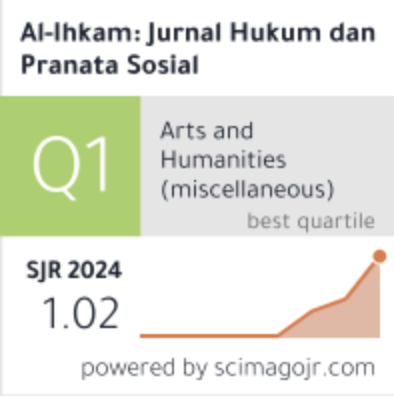Indigenous Sanction of Expulsion in Central Aceh District (Human Rights Perspective)
 Abstract views: 595
,
Abstract views: 595
,
 PDF downloads: 303
PDF downloads: 303
Abstract
Aceh Province as an Islamic Sharia Regional has culture and customs based on the values of the Quran and Hadith. For the Acehnese people, customs and laws cannot be totally separated that Acehnese customary law continues to grow until the birth of Acehnese Qanun Number 9 of 2008 concerning the Development of Indigenous and Customary Life. In the implementation, the customary sanctions experience some obstacles due to their unwritten characteristic that made them slightly shifted by the presence of national law. As what happens nowadays in Central Aceh District which is famous with its traditional values, there found legal issues for the customary instrument (Sarak Opat) when the customary sanctions considered discriminatory and arbitrary. Therefore, the settlement of customary disputes must be in accordance with humanitarian principles prioritizing the principle of deliberation and peace although many obstacles still exist at the level of implementation because of lack of understanding by both community and customary instruments related to the implementation of customary itself.
Downloads
References
Abu Bakar, Al-Yasa’. Syari’at Islam di Nanggroe Aceh Darussalam, Paradigma Kebijakan dan Kegiatan, Dinas Syari’at Islam Provinsi Nanggroe Aceh Darussalam, Banda Aceh, 2005
Abubakar, Lastuti. Revitalisasi Hukum Adat sebagai sumber Hukum dalam Membangun Sistem Hukum Indonesia, Jurnal Dinamika Hukum, Vol. 13 No. 2 (Mei 2013). http://dx.doi.org/10.20884/1.jdh.2013.13.2.213
Ahmad Zein, Yahya . Nurvianti, Dewi. “Konsepsi Hak Masyarakat Hukum Adat Sebagai Hak Asasi Manusia”, Fakultas Hukum Universitas Borneo Tarakan, Vol. 3 No. 2 (2017) http://dx.doi.org/10.25123/vej.2689
Darmawan, “Peranan sarak Opat dalam Masyarakat Gayo”, Jurnal Kanun, Vol. 12 Nomor 1, (Edisi April 2010). https://doi.org/10.24815/kanun.v12i1.6289
http://dx.doi.org/10.30821/miqot.v38i1.98
Hariyanto, Erie. “Burgelijk Wetboek (Menelusuri Sejarah Hukum Pemberlakuannya Di Indonesia).” Al-Ihkam: Jurnal Hukum Dan Pranata Sosial 4, no. 1 (3 September 2013): 140–52.
Muhammad, Bushar. Asas- asas Hukum Adat suatu pengantar, cet XII, Pradnya Paramita, Jakarta, 2003
Muhammad, Rusydi Ali. Revitalisasi Syaria’at Islam di Aceh Problem, Solusi dan Implementasi menuju Pelaksanaan Hukum Islam di Nanggroe Aceh Darussalam, Cet. I, Logos Wahana Ilmu, Jakarta, 2003
Murdan, “Pluralisme Hukum (Adat dan Islam) di Indonesia”, Mahkamah: Jurnal Kajian Hukum Islam, Vol 1 No. 1 (Tahun 2016). http://dx.doi.org/10.24235/mahkamah.v1i1.573
Safrijal, Airi. “Penerapan Sanksi Adat dalam Penyelesaian Perkara Pidana di Kabupaten Nagan Raya”. Jurnal Kanun Ilmu Hukum, Volume No. 15 Nomor 1 (Tahun 2013). https://doi.org/10.24815/kanun.v15i1.6165
Soedjatmoko, Pembangunan dan Kebebasan, Jakarta: LP3ES, 1984
Sukiman: “Nilai-Nilai Pembangunan Islam dalam Masyarakat Adat Gayo”, Miqoot, Vol. XXXVIII No.1 (Januari- Juni 2014).
Susylawati, Eka. “Eksistensi Hukum Adat dalam Sistem Hukum di Indonesia”, Jurnal Al Ihkam, Vol. IV No.1, (Juni 2009).
Syahbandir, Mahdi. “Kedudukan Hukum Adat dalam Sistem Hukum”, Jurnal Kanun Vol. 12 No.1 (Edisi April 2010), https://doi.org/10.24815/kanun.v12i1.6285
Syamsudin. M, “Beban Masyarakat Adat Menghadapi Hukum Negara”, Jurnal Hukum, Vol. 15 No. 3 (Juli 2008). https://doi.org/10.20885/iustum.vol15.iss3.art9
Syukri, Sarakopat: Sistem Pemerintahan Tanah Gayo Dan Relevansinya Terhadap Pelaksanaan Otonomi Daerah Jakarta: Hijri Pustaka Utama, 2006
Taqwaddin, “Penyelesaian Sengketa/ Perselisihan secara Adat Gampong di Aceh”, Jurnal Kanun Ilmu Hukum, Vol. 17 No.3, (Des, 2015) https://doi.org/10.24815/kanun.v17i3.6085
Taqwaddin, Kapita Selekta Hukum Adat Aceh dan Qanun Wali Nanggroe, Bandar Publishing, Syiah Kuala, banda Aceh, 2013
Wijayanti, Asri dan Achmad, Lilik Sofyan. Strategi Penulisan Hukum, Lubuk Agung, Bandung, 2011
In order to be accepted and published by Al-Ihkam: Jurnal Hukum dan Pranata Sosial, author(s) submitting the article manuscript should complete all the review stages. By submitting the manuscript, the author(s) agreed to the following terms:
- The copyright of received articles shall be assigned to Al-Ihkam: Jurnal Hukum dan Pranata Sosial as the publisher of the journal. The intended copyright includes the right to publish articles in various forms (including reprints). Al-Ihkam: Jurnal Hukum dan Pranata Sosial maintain the publishing rights to the published articles.
- Authors are permitted to disseminate published articles by sharing the link/DOI of the article at Al-Ihkam: Jurnal Hukum dan Pranata Sosial. Authors are allowed to use their articles for any legal purposes deemed necessary without written permission from Al-Ihkam: Jurnal Hukum dan Pranata Sosial with an acknowledgment of initial publication to this journal.
- Users/public use of this website will be licensed to CC-BY-SA.



.png)
_1.png)


_page-00011.jpg)








